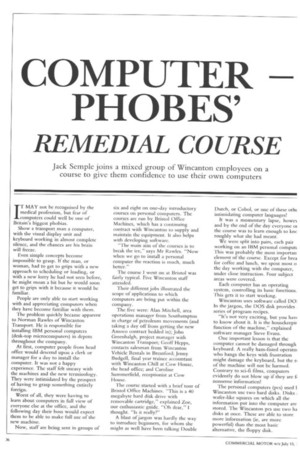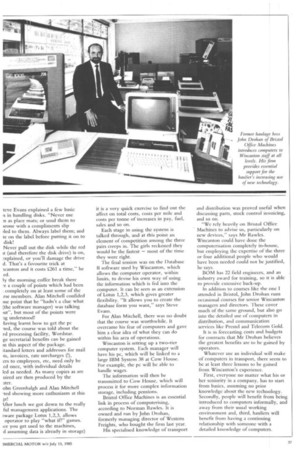COMPUTER PHOBES'
Page 38

Page 39

If you've noticed an error in this article please click here to report it so we can fix it.
REMEDIAL COURSE
Jack Semple joins a mixed group of Wincanton employees on a course to give them confidence to use their own computers
IT MAY not be recognised by the medical profession, but fear of computers could well be one of Britain's biggest phobias.
Show a transport man a computer, with the visual display unit and keyboard working in almost complete silence, and the chances are his brain will freeze.
Even simple concepts become impossible to grasp. If the man, or woman, had to get to grips with a new approach to scheduling or loading, or with a new lorry he had not seen before, he might moan a bit but he would soon get to grips with it because it would be familiar.
People are only able to start working with and appreciating computers when they have become familiar with them.
The problem quickly became apparent to Norman Rawles of Wincanton Transport. He is responsible for installing IBM personal computers (desk-top microcomputers) in depots throughout the company.
At first, computer people from head office would descend upon a clerk or manager for a day to install the computer. It was not a happy experience. The staff felt uneasy with the machines and the new terminology. They were intimidated by the prospect of having to grasp something entirely foreign.
Worst of all, they were having to learn about computers in full view of everyone else at the office, and the following day their boss would expect them to be able to make full use of the new machine.
Now, staff are being sent in groups of six and eight on one-day introductory courses on personal computers. The courses are run by Bristol Office Machines, which has a continuing contract with Wincanton to supply and maintain the equipment. It also helps with developing software.
"The main aim of the courses is to break the ice," says Mr Rawles. "Now when we go to install a personal computer the reaction is much, much better."
The course I went on at Bristol was fairly typical. Five Wincanton staff attended.
Their different jobs illustrated the scope of applications to which computers are being put within the company.
The five were: Alan Mitchell, area operations manager from Southampton in charge of petroleum movements (and taking a day off from getting the new Amoco contract bedded in); John Greenhalgh, project manager with Wincanton Transport; Geoff Hepps, contacts salesman from Wincanton Vehicle Rentals in Brentford; Jenny Budget', final year trainee accountant with Wincanton Chill at Cow House, the head office; and Caroline Sum merfield, receptionist at Cow House.
The course started with a brief tour of Bristol Office Machines. "This is a 40 megabyte hard disk drive with removable cartridge," explained Zoe, our enthusiastic guide. "Oh dear," I thought. "Is it really?"
A blast of jargon was hardly the way to introduce beginners, for whom she might as well have been talking Double Dutch, or Cobol, or one of these otht intimidating computer languages!
It was a momentary lapse, howe‘ and by the end of the day everyone or the course was to learn enough to knc roughly what she had meant.
We were split into pairs, each pair working on an IBM personal compuu This was probably the most irnportair element of the course. Except for brea for coffee and lunch, we spent most o the day working with the computer, under close instruction. Four subject areas were covered.
Each computer has an operating system, controlling its basic functions. This gets it to start working.
Wincanton uses software called DO: In the jargon, the DOS disk provides. series of program recipes.
"It's not very exciting, but you havi to know about it. It is the housekeepit function of the machine," explained software manager Steve Evans.
One important lesson is that the computer cannot be damaged through keyboard. A really ham-fisted operatoi who bangs the keys with frustration might damage the keyboard, but the n of the machine will not be harmed. Contrary to sci-fi films, computers evidently do not blow up if they are fl nonsense information!
The personal computers (pcs) used I Wincanton use two hard disks. Disks . wafer-like squares on which all the information put into the computer are stored. The Wincanton pcs use two ha disks at once. These are able to store more information (ie, are more powerful) than the most basic alternative, the floppy disk.
teve Evans explained a few basic s in handling disks. "Never use Ti as place mats; or send them to leone with a compliments slip 'led to them. Always label them; and te on the label before putting it on to disk!
Never pull out the disk while the red it (and therefore the disk drive) is on, explained, or you'll damage the drive d. That's a favourite trick at wanton and it costs £261 a time," he ed.
Sy the morning coffee break there e a couple of points which had been completely on at least some of the rse members. Alan Mitchell confided me point that he "hadn't a clue what the software manager) was talking .ut", but most of the points were ig understood!
laving learnt how to get the pc led, the course was told about the rd processing facility, Wordstar. ge secretarial benefits can be gained in this aspect of the package.
ltandard letters and addresses for mail invoices, rate surcharges (!), ers to employees, etc, need only be cd once, with individual details led as needed. As many copies as are uired are then produced by the ater.
ohn Greenhalgh and Alan Mitchell -ted showing more enthusiasm at this 4e!
kfter lunch we got down to the really ful management applications. The tware package Lotus 1,2,3, allows operator to play "what if?" games. Lee you get used to the machines, d assuming data is already in storage) it is a very quick exercise to find out the affect on total costs, costs per mile and costs per tonne of increases in pay, fuel, sales and so on.
Each stage in using the system is talked through, and at this point an element of competition among the three pairs creeps in. The girls reckoned they would be the fastest — most of the time they were right.
The final session was on the Database II software used by Wincanton, which allows the computer operator, within limits, to devise his own way of using the information which is fed into the computer. It can be seen as an extension of Lotus 1,2,3, which gives greater flexibility. "It allows you to create the database form you want," says Steve Evans.
For Alan Mitchell, there was no doubt that the course was worthwhile. It overcame his fear of computers and gave him a clear idea of what they can do within his area of operations.
Wincanton is setting up a two-tier computer system. Each manager will have his pc, which will be linked to a large IBM System 38 at Cow House. For example, the pc will be able to handle wages.
The information will then be transmitted to Cow House, which will process it for more complex information storage, including pensions.
Bristol Office Machines is an essential link in process of computerising, according to Norman Rawles. It is owned and run by John Drohan, formerly managing director of Western Freights, who bought the firm last year.
His specialised knowledge of transport and distribution was proved useful when discussing parts, stock control invoicing, and so on.
"We rely heavily on Bristol Office Machines to advise us, particularly on new devices," says Mr Rawles. Wincanton could have done the computerisation completely in-house, but employing the expertise of the three or four additional people who would have been needed could not be justified, he says.
BOM has 22 field engineers, and an industry award for training, so it is able to provide extensive back-up.
In addition to courses like the one I attended in Bristol, John Drohan runs occasional courses for senior Wincanton managers and directors. These cover much of the same ground, but also go into the detailed use of computers in distribution, and communication services like Prestel and Telecom Gold.
It is in forecasting costs and budgets for contracts that Mr Drohan believes the greatest benefits are to be gained by operators.
Whatever use an individual will make of computers in transport, there seem to be at least three lessons to be gained from Wincanton's experience.
First, everyone no matter what his or her seniority in a company, has to start from basics, assuming no prior knowledge about the new technology. Secondly, people will benefit from being introduced to computers informally, and away from their usual working environment and, third, hauliers will benefit from having a continuing relationship with someone with a detailed knowledge of computers.




















































































